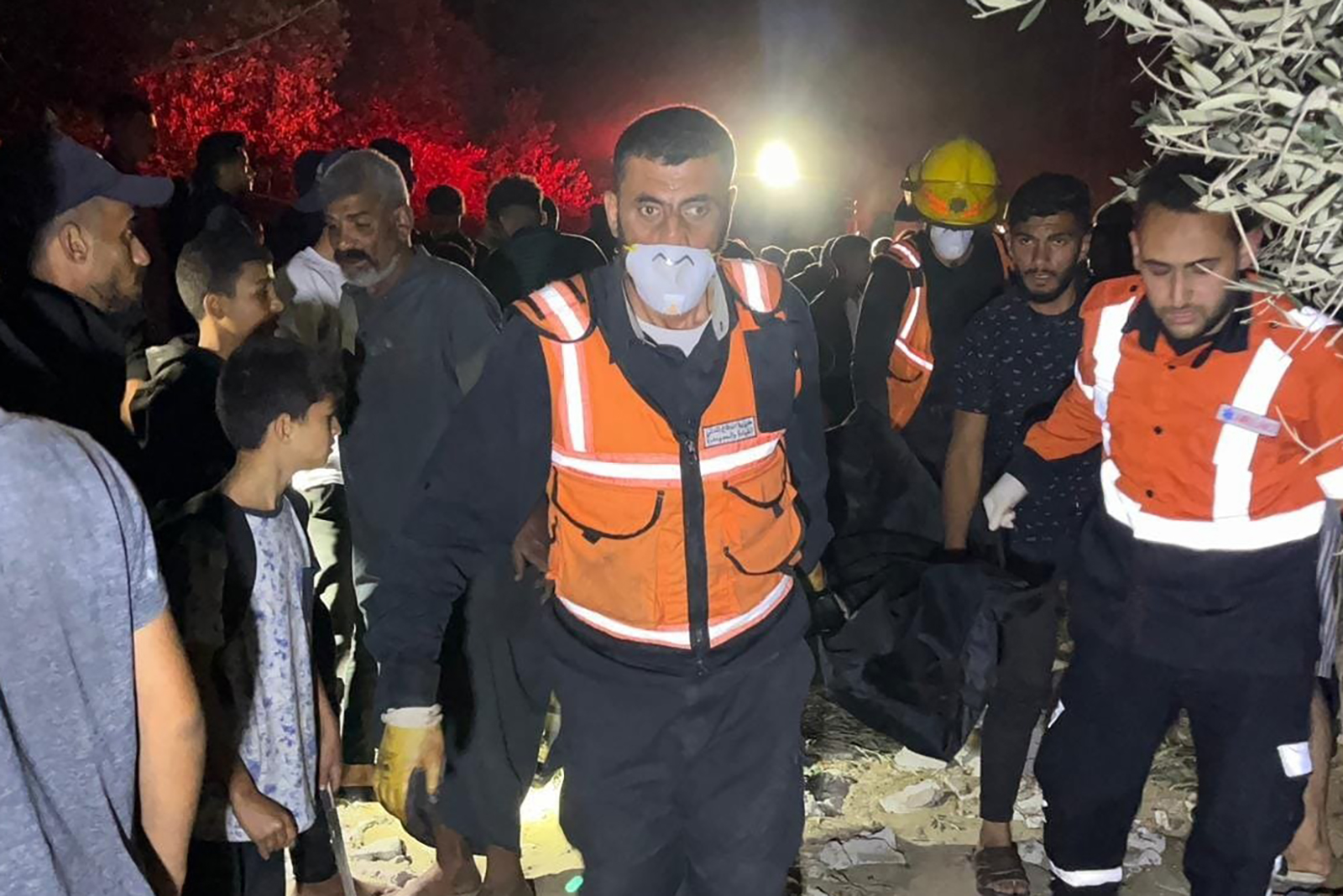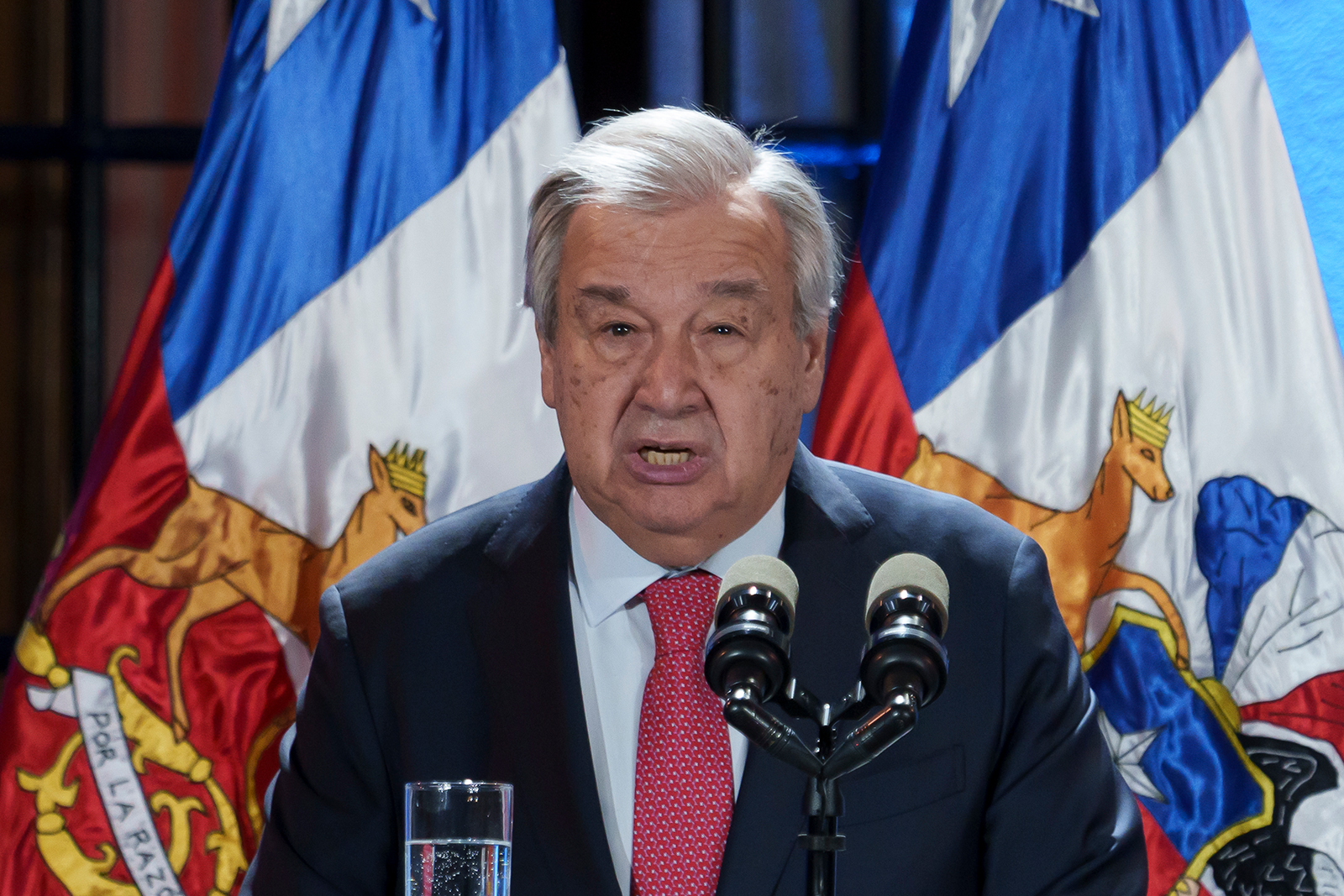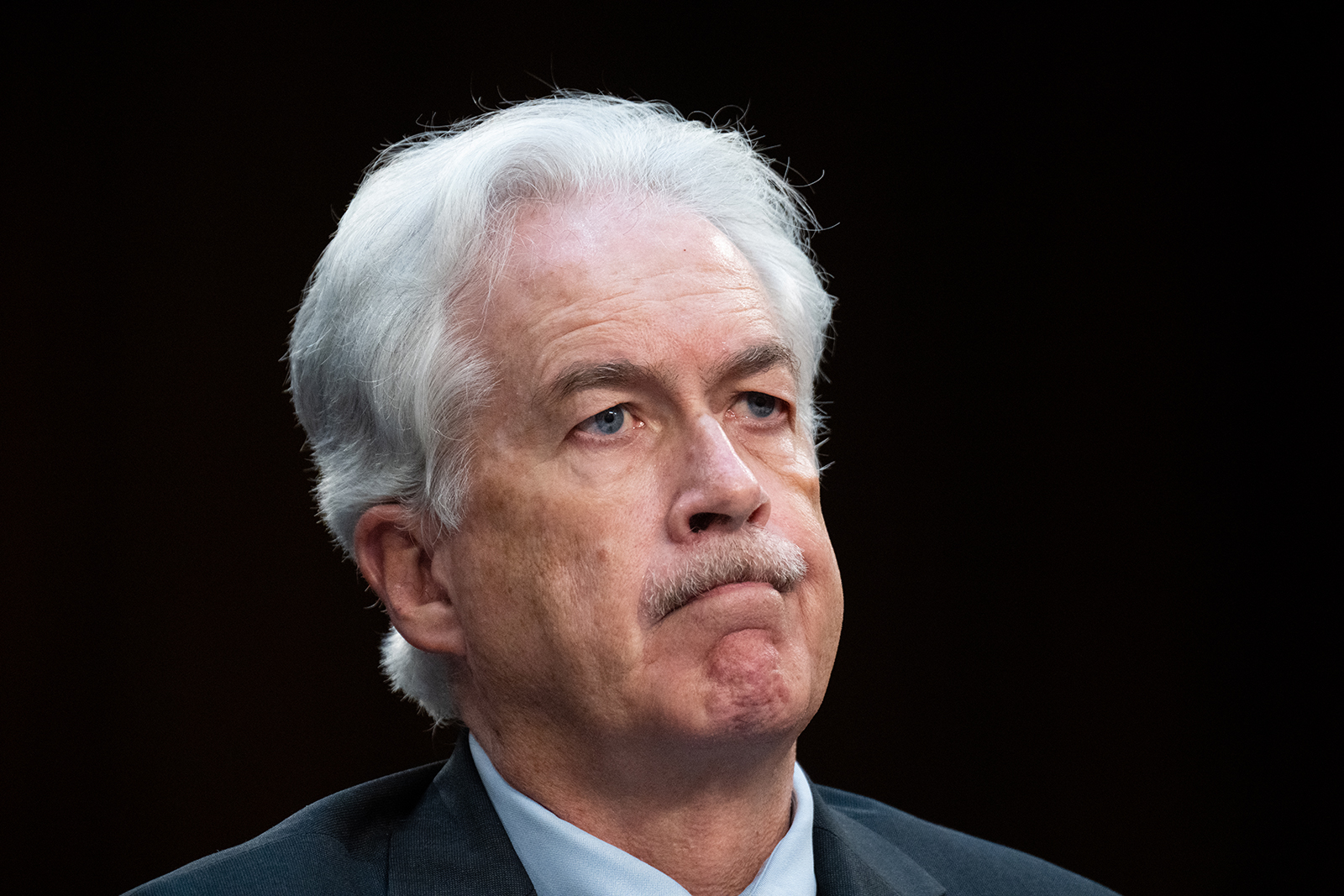Our live coverage of Israel's war in Gaza has moved here.
May 6, 2024 Israel-Hamas war
By Kathleen Magramo, Adam Renton, Antoinette Radford, Sana Noor Haq, Ed Upright, Tara John, Aditi Sangal and Elise Hammond, CNN
It's morning in Gaza. Here's what you need to know
From CNN staff
Israeli airstrikes killed multiple people in Rafah early Tuesday, Palestinian officials said, after Israel reiterated its commitment to an offensive in southern Gaza.
Israel has vowed to "exert military pressure on Hamas" in Rafah after saying the ceasefire terms the Palestinian militant group responded to Monday were "far from" meeting its demands.
International leaders, including the United Nations chief, have urged Israel and Hamas to agree to a ceasefire deal as tensions escalate on the ground after the Israeli military called on Palestinians in eastern Rafah to "evacuate immediately."
Here's what to know:
- Negotiations stall: Hamas on Monday said it responded a ceasefire deal proposed by Egypt and Qatar, but Israel said the terms Hamas accepted were still far from meeting its "requirements." However, Israel said it will send a delegation to Cairo for further talks, which mediator Qatar said would resume Tuesday.
- Deadly strikes: Palestinian officials reported multiple fatalities in Rafah following Israeli airstrikes early Tuesday. It comes after at least 26 people were killed by strikes from late Sunday into the early hours of Monday, the Civil Defense said. Separately, video and images showed multiple explosions in Rafah on Monday night, which US officials said they did not believe to be the beginning of Israel's operation.
- Mass evacuations: Palestinians evacuating eastern Rafah described their fear and despair, after Israel's evacuation order raised fears that its long-threatened assault on the city could be imminent. Throughout the war, more than 1 million Palestinians have fled to Rafah, where Hamas is believed to have regrouped after Israel’s destruction of much of northern Gaza.
- International response: Qatar and Jordan expressed hope for a ceasefire deal, while the White House said the US remains opposed to an Israeli ground invasion of Rafah and that President Joe Biden had been briefed about where things stand on negotiations. Meanwhile, the UN secretary-general warned that a Rafah ground invasion would be "intolerable" and the UN human rights chief called Israel's evacuation order "inhumane."
Biden and the king of Jordan discussed Gaza and hostages in a White House meeting
From CNN's Nikki Carvajal
US President Joe Biden and King Abdullah II of Jordan “discussed the latest developments in Gaza and affirmed their commitment to work together towards an enduring end to the crisis” during their lunch at the White House Monday, the White House said.
“They further underscored the need for an immediate release of the hostages held by Hamas and a sustainable ceasefire that allows for a surge of the urgently needed humanitarian assistance to be delivered safely through Gaza,” a readout of the meeting released by the White House said.
“Both remain committed to achieving a durable, lasting peace to include a pathway to a Palestinian state, with security guarantees for Israel," the readout said.
Both Biden and Abdullah “reiterated their shared commitment to facilitating the increased, sustained delivery of life-saving humanitarian assistance to Palestinian civilians in Gaza,” the White House said. Biden also thanked the king for his “critical leadership and partnership in this effort.”
Abdullah warned Biden in their meeting that an Israeli attack on Rafah, where about 1.4 million Palestinians are internally displaced "threatens to lead to a new massacre," according to a post on X from Jordan's Royal Hashemite Court.
Israeli airstrikes kill multiple people in Rafah, Palestinian Civil Defense says
From CNN's Eyad Kourdi and Kareem El Damanhoury

A number of Palestinians were killed, and others were injured due to multiple airstrikes on Rafah on early Tuesday early, local time, according to a statement published by the Palestinian Civil Defense.
“Civil defense teams have managed to pull out a number of martyrs and transport several injured individuals from under the rubble of several homes which were bombed by Israeli warplanes tonight in various places in the Rafah governorate in southern Gaza Strip,” the Palestinian Civil Defense statement read.
Along with the statement, the Civil Defense published photos showing at least two dead bodies inside body bags.
Eight Palestinians were killed in two attacks on Rafah, although the exact timeframe remains unclear, according to the Palestinian official news agency WAFA.
Rafah's Kuwait hospital said it received 11 dead, according to a post on its Facebook account in the early hours of Tuesday local time.
CNN has reached out to the Israel Defense Forces regarding Tuesday morning's strikes in Rafah.
Airstrikes intensified: The strikes in southern Gaza comes after the Israeli Prime Minister's Office said Monday that the military operation in Rafah will continue to "exert military pressure on Hamas".
The IDF also said on Monday that it is “currently conducting targeted strikes against Hamas terror targets in eastern Rafah in the southern Gaza Strip.”
Overnight from Sunday through the early hours of Monday, at least 26 people were killed in strikes on Rafah, according to the Civil Defense.
UN secretary-general says a ground invasion of Rafah would be "intolerable"
From CNN's Richard Roth

A ground invasion of Rafah would be "intolerable," United Nations Secretary-General António Guterres said on Monday.
"A ground invasion in Rafah would be intolerable because of its devastating humanitarian consequences and because of its destabilizing impact in the region," the UN chief warned.
Guterres said he had made a "very strong appeal" to both the Israeli government and the leadership of Hamas to "go an extra mile" to reach a ceasefire agreement.
"This is an opportunity that cannot be missed," he added.
Apparent gunfire heard from Egyptian side of Rafah crossing, Egyptian state TV report shows
From Eyad Kourdi
Sounds of apparent gunfire could be heard early Tuesday morning local time in a recording from Egyptian state TV Al Qahera news, of the Rafah border crossing from the Egyptian side.
The looped bump shot appears to show a checkpoint with no people in the frame. The gunshots were heard around 1:33 a.m. local time according to the state broadcaster.
It is not immediately clear if this is the start of ground operations in Rafah.
CNN cannot independently verify that the sound is of gunfire and what the source is.
Mediators reworked the proposal Hamas responded to over the last few days
From CNN's Alex Marquardt and MJ Lee

Over the past few days, mediators reworked the proposal that Hamas responded to on Monday to get past hurdles that weren’t going to work for Israel, two sources familiar with the talks said.
CIA Director Bill Burns traveled to Cairo late last week and then on to Doha where he worked with the Qataris on the language so that it could be a workable basis for discussions with Israel.
Hamas responded to this re-worked framework on Monday, both sources said. Based on that draft, Israel will send a working-level team of experts to join more talks in Cairo on Tuesday, one source said.
According to the second source, a diplomat, Burns was in meetings with Qatar’s prime minister when the Hamas response came in and Burns was immediately given a copy.
The toughest part has been the question of a permanent ceasefire and the ways to address the issue in an agreement, one of the sources familiar with the discussions said.
That goal of a permanent ceasefire is not mentioned in the first phase of the proposal, the source said. Instead, the first phase is when Israeli hostages and Palestinian prisoners are expected to be released during a multi-week pause in the fighting. Officials believe more negotiations will be needed before a permanent ceasefire is reached, the first source said.
Meanwhile, United States officials have pushed back on Hamas’ initial public declaration on Monday that they had “agreed” to a ceasefire agreement, saying that in fact, what Hamas did was to come back with a counterproposal with changes. That counterproposal will need further negotiation, the US officials said, describing what Hamas presented as “amendments” to an earlier proposal.
Proposal accepted by Hamas includes hostage release and a gradual Israeli withdrawal from Gaza
From CNN's Nic Robertson and Mostafa Salem
The proposed agreement mediated by Qatar and Egypt and accepted by Hamas starts with the release of 33 Israeli hostages over 42 days and ends with the rebuilding of Gaza amid “a period of sustainable calm,” according to a document shared with CNN by a source in the region familiar with negotiations.
The copy of the framework details that the agreement will be divided into three phases, each 42 days long. It will also include an eventual full Israeli withdrawal from Gaza in the second phase, according to the document and Hamas senior official Khalil Al-Hayya, who spoke to Al Jazeera.
Here's a breakdown of each phase:
The first phase
- This phase says Hamas will release 33 hostages — specifically women, children, elderly and those sick — in exchange for a gradual withdrawal of Israeli forces from parts of Gaza, the halting of reconnaissance flights for 10 hours daily, the free movement of disarmed Palestinians throughout the Gaza Strip and the release of hundreds of Palestinian prisoners.
- In this phase, 30 Palestinian women and children will be released for every Israeli hostage released by Hamas, and 30 Palestinian prisoners over the age of 50 for every Israeli hostage over the age of 50.
- Female IDF soldiers are to be released as part of the 33 hostages, but for every Israel Defense Forces woman soldier released, Israel is to release 50 Palestinian prisoners, including 30 serving life sentences.
- Every week Hamas will release three hostages. On the sixth and final week, the rest of the hostages are to be released to fulfill the 33 number agreed upon, according to the document. The agreement also says that Hamas could include the bodies of dead hostages to reach the 33 number.
- An extensive effort will begin for the entry of humanitarian aid into Gaza, including makeshift shelters and homes, and the rehabilitation of key infrastructure, including hospitals and the electric plant, the document says.
The second phase
- The document did not fully expand on the details of the second phase of the agreement, which is set to include a “sustainable period of calm” in Gaza and the release of the remaining hostages, including civilian men and IDF male soldiers.
The third phase
- A three-to-five-year Gaza rebuilding plan is to start in this phase, according to the document.
Multiple explosions reported in Rafah area of southern Gaza
From CNN's Abeer Salman and MJ Lee
Video and images obtained by CNN showed multiple explosions in the Rafah area of southern Gaza on Monday night.
Local social media accounts reported that the explosions were to the east of Rafah, an area where the Israel Defense Forces had ordered an evacuation of civilians earlier Monday.
United States officials are closely monitoring reports of the explosions and have “real concerns” about the situation that is unfolding, but do not believe this is the beginning of a major Israel military operation into southern Gaza, US officials told CNN.
The Biden administration remains opposed to Israel going into Rafah, as White House spokesman John Kirby told reporters repeatedly earlier Monday afternoon. And while the current situation is concerning, these US officials stressed that for now, they believe the reports of strikes in Rafah are limited in scope.
This post has been updated with additional information from the US.



